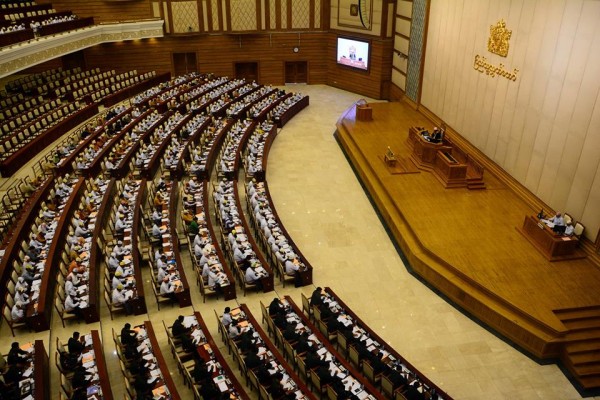In late November, after months of debate, the upper house of Burma’s parliament voted to change the method for electing its MP. This decision may well determine the balance of power in parliament following the 2015 general election.
The decision was to switch from a first-past-the-post (FPTP) system, in which candidates run in single-member districts, to a form of proportional representation (PR), which will elect batches of candidates in multi-member districts corresponding to states and divisions.
[pullquote]It is unclear if the Union Election Commission will be able to successfully implement the new system for elections less than nine months away[/pullquote]
National League for Democracy (NLD) opposition politicians requested that Burma’s Constitutional Tribunal issue a ruling on the change, but indications suggest that the revised system will remain in place for the 2015 vote. The implications of this new system on electoral outcomes are not entirely clear. The limited availability of polling and other data makes it difficult to predict the specific result of the change, particularly given its restricted nature.
Generally speaking, though, the move appears to have improved the ruling Union Solidarity and Development Party’s (USDP) chances to keep upper house seats in majority-ethnic Burman divisions. Many observers assume that the NLD is on track to crush the USDP in 2015. Since PR systems tend to give the largest vote-getting party fewer seats relative to FPTP systems, USDP MPs stand to gain if current predictions hold.
But the change also poses potential drawbacks for the USDP. Most importantly, it undermines USDP MPs’ ability to reap the benefits of incumbency. By shaking up the system, upper house MPs have shaken up the electoral map, potentially to their detriment.
The new system’s impact in ethnic states will likely be mixed. It could weaken certain ethnic parties, like the Rakhine National Party, which have historically been dominant in their respective regions. But it could also benefit smaller ethnic parties with more diffuse support bases.
Some outside observers have praised the electoral system change. They see the degree to which proportional representation prevents the emergence of supermajorities as beneficial, particularly for multiethnic societies like Burma. PR systems, they argue, promote power sharing and are fundamentally more democratic, since they better reflect the variety of opinions and preferences of populations as a whole. In theory, they produce fewer wasted votes and allow smaller parties to compete more effectively.
In practice, however, it is unclear if the Union Election Commission will be able to successfully implement the new system for elections less than nine months away.
[pullquote]By shaking up the system, upper house MPs have shaken up the electoral map[/pullquote]
The NLD has complained that changing the electoral system so close to the date of the vote will be unnecessarily confusing for voters. The Union Election Commission itself previously questioned the feasibility of implementing a new system in 2015. In 2013, Election Commission Chairman Tin Aye warned parliament that the implementation of a new electoral system would require time, and urged MPs to approve any changes before the end of 2013—nearly a year before the upper house actually did so.
The Election Commission’s track record also raises red flags. Last September, it abruptly cancelled planned by-elections, claiming that the government was too busy with November’s Association of South East Asian Nations summit to hold the vote, which was anticipated to fill around 35 vacant parliamentary seats.
Beyond questions of feasibility, Burma’s military-drafted 2008 Constitution presents an additional obstacle to reaping the theoretical benefits of any PR system. The 25 percent of seats it reserves for Tatmadaw [Burmese military] MPs throws off traditional calculations about PR’s ability to achieve more representative legislatures.
Put simply, a landslide victory might not yield a legislative majority for the winning party under a PR system given the military’s position. The upper house’s decision, therefore, could lead to a scenario in which the NLD wins a majority of votes nationwide but is narrowly denied the opportunity to elect a president and a parliamentary speaker. As such, a partial change to the electoral system without a corresponding revision of key constitutional provisions could end up exacerbating the very problems that a PR system purports to fix by giving unelected military MPs enormous power to decide who governs the country.
Ultimately, the system adopted by the upper house is not as dramatic a change as some initial proposals, which included forms of nationwide PR that would have required constitutional revisions and could have drastically diminished ethnic minority representation in the chamber.
[related]
In addition, the lower house in parliament rejected proportional representation after the Constitutional Tribunal ruled it unconstitutional for that body (based on the 2008 Constitution’s requirement of single-member districts for electing lower house MPs). While the prospect of a split electoral system sets up additional stumbling blocks for an already overburdened Union Election Commission, the lower house’s decision will likely mitigate the impact of the upper house’s adoption of PR. Since the lower house is significantly larger, its members collectively wield more power in selecting a president. If the NLD is able to win a commanding victory in lower house constituencies, the slightly skewed composition of the upper house might not make a difference in that regard.
Still, the balance of power has the potential to be fragile in the aftermath of a closely watched 2015 vote, and the upper house’s electoral system change has effectively increased the Tatmadaw’s potential to act as political kingmaker.
Oren Samet is an independent journalist and researcher based in Bangkok.



